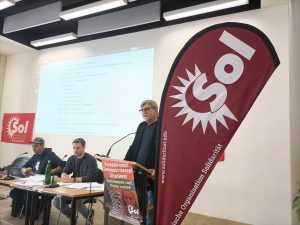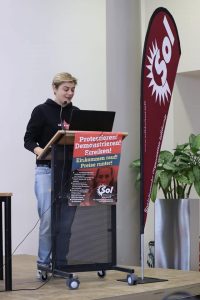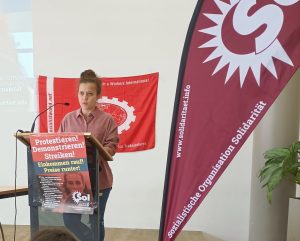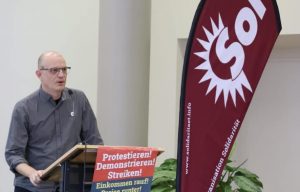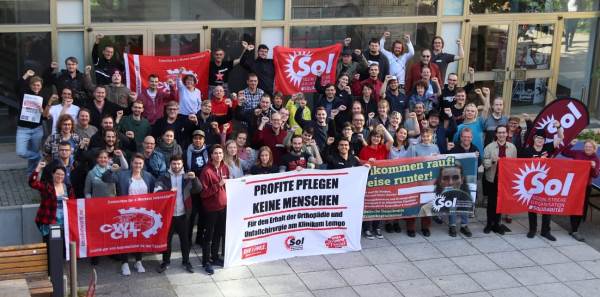
From 16 to 18 September, the successful second national conference of the Socialist Organisation Solidarity (Sol, the CWI in Germany) took place in Berlin, reports Jens Jaschik. Over the weekend, almost one hundred delegates and visitors from Germany, as well as international guests, discussed the perspectives of the class struggle and the questions that arise from the turning point in Germany and internationally.
When Sol was founded in September 2019, the beginning of a recession was looming in the industry, but it was not foreseeable that there would be a pandemic that would make physical meetings extremely difficult in the coming years. The first national conference of Sol in November 2020 had to take place online. This time almost one hundred participants from 22 cities came together from Friday and Sunday to discuss the political and economic perspectives in Germany and the world; to analyse the developments of the class struggle, and to plan the next steps in building our organisation. Visitors from France, Austria and Cameroon, as well as a representative of the International Secretariat of the Committee for a Workers’ International (CWI), also attended the conference.
The conference was characterised by its enthusiastic atmosphere. Finally, it was possible to discuss and exchange directly and in person as an organisation again. In its greeting sent to the national conference, the Socialist Party, sister party of the Sol in England & Wales, stressed the importance of meeting in person to come together, discuss and clarify our perspectives and analyse in the face of the worsening world situation. Many Sol members met at this conference for the first time, reflecting the fact that many new members have joined in the last three years – we have increased our membership by fifty percent in that time. The discussions were characterised by many contributions from young comrades, some of whom have only joined the organisation in the last twelve months. The discussions showed the high political level of the organisation and a great unity in programme and methods.
The world in turmoil
The developments in Germany and the perspectives for the class struggle cannot be seen in isolation from the developments and perspectives of world capitalism. Traditionally, the national conference, therefore, begins with a discussion on international perspectives, which this year was introduced by Sascha Staničić, the Sol federal spokesperson and a member of the CWI’s International Executive Committee.
Sascha stressed that the world has entered a new, unstable epoch in which a multipolar world (dis)order is emerging. This epoch will be marked by crises, wars and class struggles, by revolutions and counter-revolutions. It was easy to see the parallels in the different countries. Inflation is rising everywhere and the crisis of world capitalism is palpable. This has a particularly profound impact on the neo-colonial world, where many countries are affected by multiple crises and are under imminent threat of insolvency. The bankruptcy of one country could trigger a chain reaction. The huge mass protests against general impoverishment in Sri Lanka, which led to the overthrow of the government, show what is possible in the coming months and years.
At the same time, the world is dominated by the war in Ukraine, the outcome and further course of which cannot be predicted, but the consequences of which are disastrous. The war has led to a massive movement of refugees and intensified crisis factors. Heightened international tensions are becoming a slow element of the new era.
Cécile Rimbaud of Gauche Révolutionnaire, the French section of the Committee for a Workers’ International, reported among other things on the intervention in Mélenchon’s election campaign. She also spoke about the shortcomings of La France Insoumise, which has continued to weaken its programme since its foundation in 2016. Meanwhile, Mélenchon no longer speaks of ‘socialism’. At the same time, he has initiated an electoral alliance with NUPES, which also includes pro-capitalist parties, such as the Greens and the social democratic Parti Socialiste.
Our French comrades focused their campaign on supporting the France Insoumise campaign, patiently explaining to activists and voters that the pro-capitalist forces cannot be trusted and that Mélenchon needs a radical socialist programme to bring about real change. This alone is not enough, but a real movement and party with democratic structures must be built to involve all layers of the working class and youth in the struggle against capitalism. Despite these difficult tasks, our French sister section was able to win new young comrades and is currently in the process of founding a branch.
Laura reported on the steps in building a new CWI group, Socialist Offensive, in Austria. In 2019 she was the only CWI member in Austria. Since then, we could build up a first small group, with many contacts and interested people. With the support of comrades from Germany, Socialist Offensive intervened at this year’s Volksstimmefest of the Austrian Communist Party in Vienna and sold over 150 copies of their newspaper, as well as numerous books from the Manifest publishing house. Even though we are still a small group in Austria, the foundation for the further building of the CWI has been laid.
Turning point
The conference then went on to discuss the perspectives of German capitalism and the so-called ‘turn of times’, which affects all areas of capitalist society and the class struggle. Tom Hoffmann from the Sol national leadership introduced this discussion.
With a package of a 100 billion euro increase in arms spending, the so-called ‘Traffic light’ government decided on the biggest military budget in post-1945 history and has the goal of building Germany into one of the strongest military powers. At the same time, there is a shortage of money everywhere and the working class is bearing the burden of the crisis. The “relief package” agreed shortly before the conference does not provide any real relief. Instead, with the fuel rebate and the coming gas levy, those who are already making huge profits, have been “relieved”. At the same time, there are state interventions, like at the Uniper energy company or there are short-term concessions like the 9-Euro-Ticket for local and regional public transport that lasted three months.
In addition to neoliberal attacks, the search for solutions to the crisis will always involve Keynesian measures. However, the rulers always have the interests of the economy in focus. The ‘Traffic light’ government does not offer stability, and the SPD, Greens and Liberals often do not agree with each other. Disputes in the coalition are part of daily business. But all parties of the political establishment are united in shifting the crisis onto the working class. Alternatives and protests from the left are urgently needed, also to prevent the growing anger against the government from being hijacked by the right. Fewer and fewer people are prepared to accept the ruling class’s propaganda to make sacrifices.
DIE LINKE (Left Party) is in an existential crisis – although a workers’ party, in which the working class can discuss programme, methods and experiences and which offers a fighting alternative to the capitalist establishment, is bitterly needed. But DIE LINKE does not live up to this task. For every correct step it takes, like the organising defend living standards anti-protests in Leipzig, three steps in the wrong direction follow; for example, statements by Bodo Ramelow, Thuringia’s regional premier, against a ‘hot’ autumn [of industrial struggles and protests] or Sahra Wagenknecht’s speech in the Bundestag opposing the government, not on a socialist but on a partly nationalist basis.
The issues of #LeftMeToo and the poor handling of sexism in the party, its government participation with pro-capitalist parties, ingratiation with SPD and Greens, etc. lead DIE LINKE from one crisis to the next. The various currents – from Wagenknecht’s left populism to the left current “Bewegungslinke” – offer no answer to the party’s crisis.
The result is that fifteen years after the founding of DIE LINKE, things do not look good for the political representation of the interests of the working class in Germany in the coming period. The crisis of DIE LINKE can lead to a temporary disappearance of a left alternative from the political stage. This makes it all the more important to emphasise the need for a workers’ party and to explain what it should look like.
In a separate discussion introduced by Dresden trade unionist Dorit Hollasky, the conference looked at the state of the trade unions and the prospects for workplace and union struggles. The central importance of the working class and the trade unions for the class struggle and the struggle for a socialist society became clear. Dorit Hollasky explained, among other things, how the trade union bureaucracy still relies on social partnership instead of class struggle. He explained the need to network militant activists in the trade unions and to build up internal trade union opposition groups. Sol is intensively involved in the Network for Combative Trade Unions (VKG) in order to contribute to this.
The conference discussions were not abstract and theoretical but always linked to current class struggles, and comrades’ experiences and intervention in the political struggle. Here it was clear that Sol translates Marxism into practice. Various comrades reported on their involvement in trade union struggles and in the workplaces, where they gained important experience, but also encountered trade union leaderships that prevent struggles or hastily accept bad deals.
Anne reported on the strikes of the Berlin hospital movement, in the course of which she was won over to Sol. Sebastian reported on how he successfully initiated the struggle for a collective agreement in his company and René on the development of the VKG in Berlin and the efforts within ver.di to mobilise the union for a hot autumn. Currently, Sol members in different cities are participating in protests for a ‘hot’ autumn or have taken the initiative themselves to build alliances and regular protests.
In order to further intensify our work in workplaces and trade unions, we have formed a working group on health and care, which will start a publication for hospitals. Next year, we will hold a seminar for Sol members active in workplaces and trade unions.
The crisis of capitalism will sooner or later lead to generalised struggles. The working class will be confronted with increased electricity and heating costs. Many people will not be able to pay them at all. Experts estimate that inflation will reach almost ten per cent in the winter. At the same time, there is a threat of recession in the economy. This situation makes it necessary to discuss our socialist programme, again and again, and to offer socialist answers to the crisis. This is necessary to prepare for and intervene in the coming struggles. Marie, a ver.di trade unionist from Berlin, said that we need not only a ‘hot’ autumn but also a hot winter and an even hotter spring!
Building Sol
In his presentation on building Sol, Caspar Loettgers from Mainz was able to point to numerous advances and successes that we have been able to achieve in recent years. We were able to win new members in various places, and the Stuttgart delegation, in particular, stood out with its new young members. We have played a role in disputes at Berlin hospitals and thus won over strikers. In Lemgo, we have been able to anchor ourselves socially through our continuously growing local group, the mandate of a Sol member who is a LINKE city councillor, and we are currently campaigning with others against the closure of trauma surgery and orthopaedics at Lemgo hospital.
Sol members continue to campaign for militant, socialist politics in the LEFT and in its youth wing linksjugend[‘solid]. Unfortunately, the crisis of the party offers fewer opportunities for this.
The discussion focused on our contribution to a ‘hot’ autumn and above all on the question of how we will strengthen Sol. We want to almost double our membership by the next national conference in 2023. In doing so, we want to make a special effort to recruit (young) women. To discuss this and other challenges in the fight against sexism, a meeting of female Sol members will be held next year. An important aspect of building the organisation is our focus on youth. In the future, we also want to be more active in the universities to win new comrades for our socialist programme. We also want to intensify the Marxist education of our members, among other things through nationwide zoom education meetings.
In four commissions – youth work, work in the trade unions, the development of our local groups and the role of our newspaper – issues were discussed more intensively. The comrades were enthusiastic about taking the next steps in building the organisation.
The enthusiasm of the National Conference was also evident in the annual winter appeal for donations. After more than 50,000 euros in donations had already been collected this year, more than 7,500 euros were collected at the conference. By the end of the year, the number is expected to increase to 14,500 euros in donations.
Part of the money will be used to support our comrades in Pakistan, who are setting up relief stations in the Sindh region after the floods, distributing food and medicine to the workers and poor. Another part of the money will be used to pay for the travel of international comrades from Africa, Asia and South America, to enable face-to-face meetings on an international level. Especially in the neo-colonial world, the flight costs are hardly affordable for our comrades.
Finally, the national conference also elected a new National Committee, as well as a Control Commission and Financial Auditors, and passed a detailed political resolution on the situation in Germany and a resolution on building Sol.
